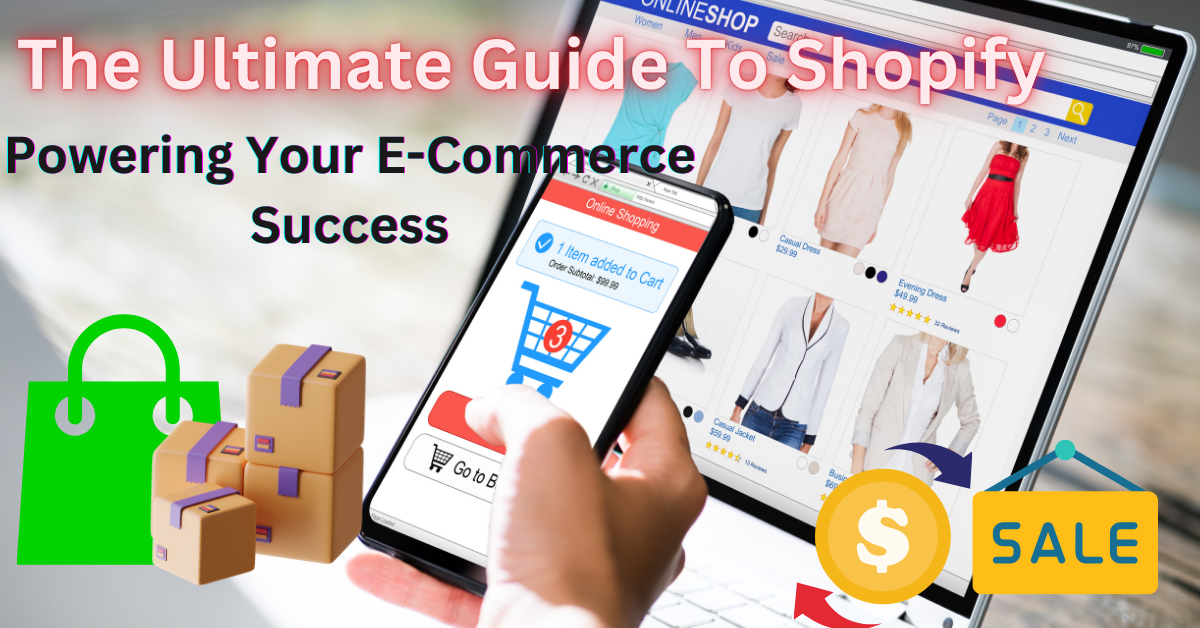The Ultimate Guide To Shopify In today’s digital age, e-commerce has become an essential component of business success. Shopify, a leading e-commerce platform, has enabled countless entrepreneurs and businesses to establish and grow their online presence.
This comprehensive guide will explore Shopify’s features, benefits, and tips for maximizing its potential to power your e-commerce success.
What is Shopify?
The Ultimate Guide To Shopify: Shopify is a cloud-based e-commerce platform designed to help businesses create and manage online stores. Founded in 2006, Shopify has grown to become one of the most popular e-commerce solutions, serving over a million businesses worldwide. The platform offers a user-friendly interface, extensive customization options, and a robust set of tools to streamline online selling. The Ultimate Guide To Shopify
Key Features of Shopify
1. User-Friendly Interface
The Ultimate Guide To Shopify: Shopify’s intuitive interface makes it easy for anyone to set up and manage an online store, regardless of technical expertise. The drag-and-drop functionality allows users to customize their store’s look and feel without writing a single line of code.
2. Customizable Themes
The Ultimate Guide To Shopify: Shopify offers a wide range of professionally designed themes, both free and paid, to suit various industries and aesthetics. These themes are fully customizable, allowing users to create a unique and engaging shopping experience for their customers.
3. Secure and Reliable
Security is a top priority for Shopify. The platform provides SSL certificates for secure transactions, ensures PCI compliance, and offers 24/7 monitoring to protect against threats. Additionally, Shopify’s reliable hosting infrastructure guarantees minimal downtime and fast loading speeds. The Ultimate Guide To Shopify
4. Mobile Optimization
With the increasing prevalence of mobile shopping, having a mobile-friendly store is crucial. Shopify’s themes are responsive, ensuring a seamless shopping experience across all devices, from desktops to smartphones.
5. Extensive App Store
The Shopify App Store features thousands of apps and integrations to enhance your store’s functionality. From marketing and SEO tools to inventory management and customer service solutions, there’s an app for every need. The Ultimate Guide To Shopify
6. Payment Processing
The Ultimate Guide To Shopify: Shopify supports multiple payment gateways, including its own Shopify Payments, which simplifies the payment process and reduces transaction fees. The platform also integrates with popular gateways like PayPal, Stripe, and more.
7. SEO and Marketing Tools
Shopify offers built-in SEO features to help your store rank higher in search engine results. The platform also provides marketing tools, such as discount codes, email campaigns, and social media integrations, to drive traffic and boost sales.
8. Analytics and Reporting
Shopify’s analytics and reporting tools give you valuable insights into your store’s performance. Track sales, monitor customer behavior, and identify trends to make informed business decisions.
Benefits of Using Shopify
1. Easy to Use
Shopify’s user-friendly interface and comprehensive support resources make it accessible to users of all skill levels. Whether you’re a seasoned entrepreneur or just starting, Shopify simplifies the process of building and managing an online store.
2. Scalability
Shopify is designed to grow your business. The platform offers various pricing plans to accommodate businesses of all sizes, from small startups to large enterprises. As your store expands, Shopify’s robust infrastructure can handle increased traffic and sales volume.
3. Customization
With Shopify’s extensive theme library and customization options, you can create a store that reflects your brand’s identity and meets your specific needs. The platform’s flexibility allows you to tailor the shopping experience to your target audience.
4. Integration Capabilities
Shopify integrates seamlessly with a wide range of third-party apps and services, allowing you to enhance your store’s functionality. Whether you need advanced marketing tools, inventory management systems, or customer support solutions, Shopify has you covered.
5. Support and Resources
Shopify offers 24/7 customer support via phone, email, and live chat. The platform also provides a wealth of resources, including tutorials, guides, and a community forum, to help you succeed.
6. Global Reach
Shopify supports multiple languages and currencies, enabling you to sell to customers worldwide. The platform’s international capabilities make it easier to expand your business and reach a global audience.
Tips for Maximizing Your Shopify Store’s Potential
1. Choose the Right Theme
Select a theme that aligns with your brand and provides a user-friendly shopping experience. Consider factors like design, functionality, and customization options when making your choice. Test different themes to find the one that best meets your needs.
2. Optimize for SEO
Implementing effective SEO strategies can significantly improve your store’s visibility in search engine results. Use Shopify’s built-in SEO features, such as customizable meta tags, alt text for images, and clean URLs. Additionally, create high-quality content and build backlinks to boost your store’s search engine rankings.
3. Utilize Apps and Integrations
Explore the Shopify App Store to find apps that can enhance your store’s functionality. From email marketing tools and social media integrations to inventory management and customer service solutions, the right apps can streamline your operations and improve the customer experience.
4. Focus on the Mobile Experience
Ensure your store is optimized for mobile devices, as a significant portion of online shopping occurs on smartphones and tablets. Choose a responsive theme, test your store’s mobile performance, and make any necessary adjustments to provide a seamless shopping experience.
5. Leverage Social Media
Integrate your Shopify store with social media platforms to drive traffic and increase sales. Utilize social media advertising, create engaging content, and encourage user-generated content to build a strong online presence and connect with your audience.
6. Implement Email Marketing
Email marketing is a powerful tool for nurturing customer relationships and driving repeat sales. Use Shopify’s email marketing tools or third-party apps to create targeted campaigns, send personalized offers, and keep your customers engaged.
7. Monitor Analytics
Regularly review your store’s analytics to track performance and identify areas for improvement. Pay attention to key metrics like traffic, conversion rates, and average order value. Use this data to make informed decisions and optimize your store’s performance.
8. Offer Exceptional Customer Service
Providing excellent customer service can set your store apart from the competition. Use Shopify’s customer support tools, such as live chat and helpdesk integrations, to address customer inquiries promptly. Offer clear return policies and ensure a smooth shopping experience to build trust and loyalty.
9. Use High-Quality Images
Visual appeal plays a significant role in online shopping. Use high-quality images to showcase your products and create a professional look for your store. Consider investing in professional photography or using image editing tools to enhance your product photos.
10. Keep Your Store Updated
Regularly update your store’s content, products, and design to keep it fresh and engaging. Add new products, create seasonal promotions, and update your blog to provide valuable information to your customers. Keeping your store current can help maintain customer interest and drive repeat business.
Conclusion
Shopify is a powerful and versatile e-commerce platform that offers a wealth of features and benefits to help businesses succeed online. Its user-friendly interface, extensive customization options, and robust set of tools make it an ideal choice for entrepreneurs and established businesses alike. By leveraging Shopify’s capabilities and implementing best practices, you can create a thriving online store that attracts customers and drives sales.The Ultimate Guide To Shopify
Whether you’re just starting your e-commerce journey or looking to enhance your existing online presence, Shopify provides the tools and support you need to achieve your goals. Embrace the potential of this leading e-commerce platform and unlock new opportunities for your business.
Frequently Asked Questions about Shopify
1. What is Shopify and how does it work?
Shopify is a cloud-based e-commerce platform that allows individuals and businesses to create, manage, and grow their online stores. It provides a user-friendly interface, customizable themes, secure hosting, and a variety of tools to handle everything from product listing to payment processing. Users can set up their stores without needing extensive technical knowledge, and they can manage their inventory, process orders, and track sales through Shopify’s comprehensive dashboard.
2. How much does Shopify cost?
Shopify offers several pricing plans to suit different business needs:
- Basic Shopify: $39 per month, suitable for new e-commerce businesses with occasional in-person sales.
- Shopify: $105 per month, ideal for growing businesses with additional features and better reporting.
- Advanced Shopify: $399 per month, designed for scaling businesses with advanced reporting and international pricing.
- Shopify Plus: Custom pricing for high-volume or enterprise businesses with specialized needs.
In addition to these plans, there are transaction fees if you’re not using Shopify Payments, and additional costs for any premium themes or apps you choose to use.
3. Can I use my own domain name with Shopify?
Yes, you can use your own domain name with Shopify. If you already have a domain, you can connect it to your Shopify store. If you don’t have one, you can purchase a new domain directly through Shopify or use a third-party domain provider. Shopify’s setup guides and support resources can help you through the process of connecting your domain to your online store.
4. Is Shopify good for SEO?
Shopify is well-regarded for its SEO capabilities. The platform offers several built-in features to help improve your store’s search engine ranking, including customizable meta tags, alt text for images, clean URL structures, and a blogging platform. Additionally, Shopify’s fast loading speeds and mobile-friendly themes enhance your site’s SEO performance. For more advanced SEO strategies, there are various apps available in the Shopify App Store that can further optimize your store.
5. How secure is Shopify?
The Ultimate Guide To Shopify: Shopify prioritizes security and reliability. The platform includes SSL certificates for secure transactions, ensuring that customer data is encrypted and protected. Shopify is also PCI DSS compliant, meaning it adheres to a set of security standards designed to protect credit card information. Moreover, Shopify provides 24/7 monitoring and regular updates to safeguard against security threats, ensuring that both store owners and customers have a safe online shopping experience.
6. Can I sell on social media and other online marketplaces with Shopify?
Yes, Shopify makes it easy to sell on social media platforms and online marketplaces. With Shopify’s integrations, you can connect your store to Facebook, Instagram, Amazon, eBay, and other sales channels. This allows you to manage your inventory, orders, and customer data from a single dashboard while reaching a broader audience. By leveraging these integrations, you can expand your sales opportunities and increase your brand’s visibility across multiple platforms. The Ultimate Guide To Shopify





